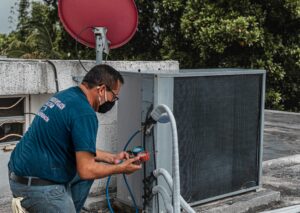Understanding Title 24 Non-Residential Mechanical Requirements
Title 24 Non-Residential Mechanical standards ensure that heating, ventilation, air conditioning, and refrigeration (HVAC&R) systems in commercial buildings meet strict energy efficiency requirements. These regulations focus on:
-
HVAC System Performance
-
Economizer Requirements
-
Demand Control Ventilation (DCV)
-
System Design and Controls
Our Title 24 Non-Residential Mechanical compliance reports provide the necessary calculations and documentation to obtain building permits and ensure compliance with California Energy Commission (CEC) standards.
Title 24 Non-Residential Mechanical System Requirements
HVAC System Performance
Title 24 requires all non-residential buildings to install energy-efficient HVAC systems that meet specific performance standards. These requirements cover:
-
Equipment efficiency for chillers, boilers, air conditioners, and ventilation systems

-
Proper system sizing to optimize energy use and occupant comfort
-
Duct design and airflow distribution to ensure effective heating and cooling
By following these regulations, businesses can significantly reduce energy consumption and operating costs while maintaining a comfortable indoor environment.
Economizer Requirements
For large commercial buildings, economizers are a mandatory energy-saving feature in HVAC systems.
What is an Economizer?
An economizer is a device that improves energy efficiency by using cool outdoor air to reduce reliance on mechanical cooling systems.
Benefits of an economizer include:
-
Lower energy consumption by reducing the need for air conditioning
-
Improved indoor air quality through fresh air ventilation
-
Extended lifespan of cooling equipment by minimizing operational strain
Types of Economizers:
-
Air-Side Economizers: Use fresh air to cool indoor spaces naturally
-
Water-Side Economizers: Utilize cool water from natural sources for energy-efficient cooling
Both types offer advantages depending on climate conditions and building needs.
Demand Control Ventilation (DCV)
Title 24 mandates Demand Control Ventilation (DCV) for buildings with high occupancy rates. DCV adjusts ventilation based on:
-
The number of occupants
-
Indoor air quality needs
This system ensures clean air circulation while reducing unnecessary energy waste from over-ventilation.
How to Achieve Title 24 Non-Residential Mechanical Compliance
Title 24 Calculations and Compliance Report
To obtain a building permit, Title 24 requires a mechanical compliance report, including:
-
CEC-NRCC-MCH-E Form – Details HVAC&R system compliance with energy regulations
-
System efficiency calculations – Ensures HVAC performance meets Title 24 standards
Our team provides Title 24 Non-Residential Mechanical reports to help your project meet California’s energy efficiency requirements.
Title 24 Documentation and On-Site Inspection
To pass building inspections, projects must have the following compliance documents on-site:
-
Certificates of Compliance (NRCC/LMCC) – Confirms the design meets Title 24 energy efficiency standards

-
Certificates of Installation (NRCI/LMCI) – Verifies that mechanical systems and materials have been correctly installed
-
Certificates of Verification (NRCA/LMCV) – Ensures performance testing has been completed and systems function properly
Missing these documents can result in:
-
Project delays
-
Failure to pass inspections
-
Non-compliance penalties
Get Your Title 24 Non-Residential Mechanical Compliance Report Today
Ensure your HVAC and mechanical systems meet California’s Title 24 energy efficiency requirements with our expert compliance services.
✔ Request a free quote for your project
✔ Receive a Title 24 Non-Residential Mechanical compliance report for permit approval